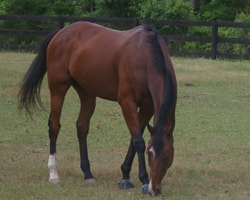
Working Your Horse in Hot Weather
Keep Your Horse Healthy and Energetic
 Working your horse in hot weather can be a risky business due to the threat of heat stress and potentially heat stroke. Heat stroke is an extremely serious condition for horses which can cause them to collapse and may prove fatal if left untreated.
Working your horse in hot weather can be a risky business due to the threat of heat stress and potentially heat stroke. Heat stroke is an extremely serious condition for horses which can cause them to collapse and may prove fatal if left untreated.
Needs of Individual Horses
Any horse can suffer discomfort in hot weather and there are various factors to take into account. Horses, just like humans, are individuals and have individual needs. Breed, size, coat length, normal body temperature and overall fitness all play a big part in how much heat a horse can cope with before heat stress occurs.
There are precautions a rider should take to reduce the risk of serious conditions developing:
- Ride at the Coolest Time of the Day
Early mornings are ideal, when both air and ground temperatures are at their lowest points. Although air temperature drops in the evening, heat stored in the ground can still elevate a horse`s temperature.
- Essential exercise only
Limit exercise to only what is absolutely essential to maintain the horse`s fitness and wellbeing. Warm up carefully, keep to a steady pace and avoid any sudden exertion, it is just as dangerous in hot weather as in cold.
- Monitor breathing and sweating
As a horse`s temperature rises, the breathing rate will increase and become shallower, resulting in discomfort and lethargy. By observing your horse`s normal breathing rate, it should be possible to know when there is something wrong.
All horses sweat, it is part of their natural cooling process. However, a full body sweat can indicate heat stress and a total absence of sweat, known as Anhydrosis, is a sign of both overheating and dehydration. Both are very serious problems.
- Cool down
Towards the end of the exercise period, cool down in the usual way, it is just as important in hot weather as at any other time. A steady walk on a long rein with a loosened girth is one way. Better still, dismount and walk the last half mile.
- Washing Down
Once back home, remove saddle and bridle as soon as possible and wash the horse off with cool water in a shaded area. Pay particular attention to the back, flanks and legs. Continue until sweating has stopped and breathing appears normal. Swinging arm Horse Wash Attachment - Wall-mounted Spray Boom Preventing hose tangling and trampling while washing your horse.
- Water
Once the horse appears comfortable, offer plenty of tepid or cool water. Avoid icy cold water as this may cause the horse to colic.
During other times, horses should have water available on demand. Horses can be fussy about their water source so clean and fresh water will encourage your horse to drink.
- Electrolytes
During exercise in hot weather, horses lose a lot of their natural body salts due to sweating. These must be replaced by using electrolytes which can be added to drinking water or horse feed. Electrolytes are minerals that carry an electric charge and regulate nerve and muscle function.
Additionally, electrolytes hydrate the body, balance blood acidity and pressure, and help rebuild damaged tissue. For horses, the primary electrolytes are sodium (Na), chloride (Cl), potassium (K), calcium (Ca),
and magnesium (Mg). quine electrolyte supplements
at reasonable prices.
- Barn Fans
One of the most important parts of cooling a horse down is to have fans in the barn to keep the air moving and helping the cool down process. The fans also help drive away flying pests that are attracted to sweaty horses. You can choose the best fans for your barn including ceiling fans, portable fans, wall fans. Be sure to keep fire safety in mind and select fans with enclosed motors. The dusty environment of a barn can be fire fuel for unenclosed fan motors.
Common Sense when Horseback Riding in the Heat
The most important thing of all is to use common sense where your horse is concerned. If it is very hot and there is no essential reason to exercise - then don`t! Get to know your horse really well, observe how he behaves or reacts to a variety of situations, how much he normally sweats and his usual recovery time after exertion. Learn how to monitor his temperature and heart rate correctly.
The main point is that the more you know about what is `normal` for your particular horse, the faster you will know that there is a problem and the quicker you can deal with it. Hot Weather Riding
Questions? Comments? Advertise? Email the Webmaster at Equestrian Horse
Copyright 2024 Equestrian Horse. All rights reserved.